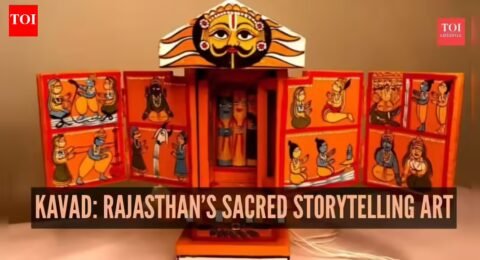American-based artist Samuel Deji Adebuga unveiled his latest exhibition on Saturday, July 13th at the 700 Bryden building in Columbus, Ohio, U.S.A. Titled ‘Deji Adebuga: The Retrospective Exhibit 2024’, the exhibition showcases Adebuga’s unique artistic vision and talent. His collection captures the essence of human emotions and experiences, offering viewers a thought-provoking and immersive artistic journey. In this interview, Adebuga invites art lovers to reflect on the complexities of life and find connection in their own personal narratives, leveraging his use of color, texture, and composition. Excerpts by JOHN SALAU:
The title of your exhibition, ‘The Retrospective Exhibit,’ suggests a look back at your journey. What have you been reflecting on lately about your life and career as an artist?
The Retrospective Exhibit 2024 is a reflection of my life journey from childhood into adulthood. My growing-up entailed joyful and unfulfilled periods. As a child artist, I was fascinated with drawing in charcoal and watercolors. Variety of animals were my favorite subject matter – horses, giraffes, elephants, goats, sheep and the rooster- “kukuruku: the timekeeper and alarmist” in rural towns or villages. Along with beautiful and colorful butterflies and of course the general environment landscape of my locality.
In what ways did your early experiences in Nigeria shape your artistic vision and style?
My artistic vision was imbued in my being, before I knew its values as a profession and the therapeutic impart on my daily life. From my elementary (grade) school through college level, I always received encouragement and accolades from my teachers, peers and professors. As a child, my teachers always called me to the blackboard to do illustrations of what we were being taught. I was always glad to do it. One of my teachers had told me at a tender age that “no matter the career path your parents want you to embark on, always take arts with you.” and that advice had stuck up with me till date.
In reflecting on your time working with Nigerian newspapers, how did the political and social climate of Nigeria at the time influence your work?
As an editorial graphic artist for Punch and Concord Press in the early 70’s until late 80’s. Both were independent newspapers that had pride in reporting fair and balanced news about political and social climates in the country as the world changed for good, bad or ugly.
What were some of the most impactful moments or pieces you created as a cartoonist and illustrator at that time?
I enjoyed designing commercial logos, branding for new ventures, advertisements, newspapers and magazines stories, lay-out formats, photo-editing (cropping) and illustrations with no technology usage. Most impactful moments included working on the design of the PUNCH newspaper’s logo, layouts and designs of HappyHome, SuperWoman and TopLife Magazines, all PUNCH publications.

What inspired you to curate ‘The Retrospective Exhibit,’ and how did you go about selecting the works included in the exhibition?
My memories hold the power to every emotion that has had about situations, telling the stories that create visual narratives that resonate across time. Deji Adebuga: ‘The Retrospective Exhibit’ aim is to bring out my body of works to the forefront as they entail and serve as an “artist diary” of documentation of happenings in our world. Every piece of my works to be exhibited has a storyline and timeline. One of them is a work of Cecil the lion titled ‘Beloved Cecil.’ Cecil was a male African lion who was a major tourist attraction and huge contributor to the national wealth of Zimbabwe. Tourists travel from all over the world just to see him at the Hwange National Park, but was killed by Walter Palmer, an American dentist in 2015.
Are there recurring themes or messages in your body of work that are reflected in ‘The Retrospective Exhibit’?
Yes, music is one of the recurring themes. A lot of my paintings depict Nigerian musical instruments, especially the ones we don’t see being used in the music industry today. One of the instruments is “Agidigbo.” It is always a joy when art lovers stand still to look at this particular work, I dive into story telling of the component and the power of agidigbo; other recurring themes are political and societal issues.
With Artificial Intelligence creeping into the creative industry, what are your thoughts on the future of art?
Artificial intelligence is very much creeping into all aspects of modern lives, including creative endeavors. It’s a welcoming development to me as an artist. Simply from “Cavemen wall art” into computerising – artificial intelligence is amazing at what human minds could achieve.
As an artist, how do you maintain your creativity and passion for art in your daily life?
I live and breathe art. I see art in everything around me. Art making in any form is very therapeutic and doing it with passion makes my day purposeful and fulfilling. A perfect statement that resonates with my life is “Life is art. Art is life. I never separate it” Ai Wei Wei.
What emotions or messages do you hope your guests took away from experiencing your exhibition?
Appreciating art is an intrinsic part of human life, enabling us to understand the human condition by blistering interaction with others. Visual art can heal emotionally and physically. It teaches us about cultures and traditions that shape our world view. Art tells stories, sparks inspiration and fuels thinking. Most viewers can gaze at a canvas or art installation and feel an immediate connection.
What were the most memorable moments for you as an artist?
For me, the paintings are about pleasure of seeing, of being cognizant of the world around us. I view each piece as being part of a single ongoing work, and as well re-reporting matters as the news break (breaking news) as ‘docu on canvas’. What do I want to say with my art? Celebrate the human, the marks people make on the world. These values of remarkable people amongst us were enshrined in the series of mu “The Notables: – Book as my canvas”. My subject matter is mature, whether it’s traditional drummers, dancers, landscapes, birds or flowers; it is captured in the spontaneous movement with the brush-stroke.
How would you describe the response to your exhibition?
It’s everything. Art is an investment of passion that enables me to engage in my local art community and nationally. For the response by the art patrons that visited my art exhibit, I do believe that they understand the value of it and that they appreciate art.
Finally, what advice will you give to emerging African or Nigerian artists?
Dedication, resilience and willingness to continuously; learn and evolve with attention to detail. Dedication is key for artist development. Also, be as efficient and professional as possible as an artist of note. So, go forth and pursue those dreams. Vision and value is also important. You might need to spend some time reflecting on what your art means to you. Make changes as necessary for the painting has a life of its own. “Good to great effects!”



